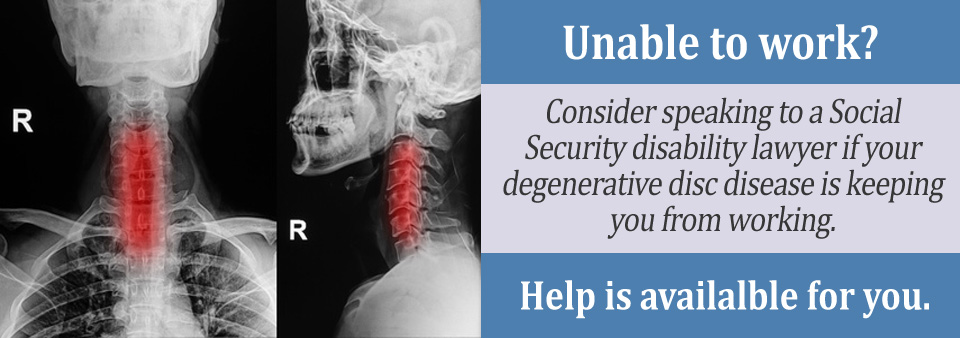If you have developed degenerative disc disease your life may be affected by permanent restrictions that may restrict your ability to earn an income to cover your everyday needs.
There are a few factors which can cause discs to degenerate which are:
- Age related when the disc dries out so with less water present doesn’t allow the absorption of shocks inflicted on the body.
- Daily activities and sports which can cause tears in the outer core of the disc.
- Injuries, which result swelling, soreness and instability that can cause lower back pain.
Whatever your reasons for contracting degenerative disease you may suffer permanent impairments as a result of it.
Permanent Restrictions You May Experience with Degenerative Disc Disease
The pain experienced from degenerative disc disease leading to permanent impairments may include any combination of the following:
- nerve and muscle pain;
- spinal inflexibility which causes pain and stiffness;
- numbness;
- tingling, muscle weakness;
- loss of balance.
The location of the degenerative disc disease may also affect the symptoms. For example, if in the neck it may cause headaches. Whether you normally work in a physical job or a sedentary job, the pain of degenerative disc disease may be enough that you are prevented from performing both mental and physical job duties. If you are unable to work due to degenerative disc disease, you might be able to qualify for social security disability benefits.
You can help yourself to live a more normal life when living with degenerative disc disease by maintaining strong and proper posture which may help to lower the pain caused by degenerative disc disease. You can also are apply either ice or a heat pad to the area that is causing you pain and the disabling condition.
Work History and Job Skills
Degenerative Disc Disease, or DDD, is among the most common impairments for which the Social Security Administration (SSA) receives disability applications. There are two types of benefits. One is called Social Security disability benefits (SSDI) which is based on your work history and how many work credits you have earned over time while the second is Supplemental Security Income (SSI) which is means tested and is awarded based on your savings and assets. When you apply for Social Security disability benefits the decision that determines your eligibility will be based on your medical records and your work history.
The disability examiner will use this information to determine if you are able to carry on with your usual job or your permanent impairment will still allow you to use skills you used in previous jobs.
Can I Perform Sedentary Work?
Sometimes the decision concerning eligibility for Social Security disability benefits is based on your ability while experiencing permanent restrictions to work in a more sedentary job. If the disability examiner denies your claim because it believes you can do a more sedentary job you may request an appeal hearing.
At this hearing you will be need to provide the evidence which proves that the symptoms from your degenerative disc disease will not allow you to even do sedentary work. Your disability claim may still be denied if a vocational expert attending the hearing agrees that, although you are suffering a permanent impairment which means you are not fit enough to do your usual job there is other work can still get paid to do.
Get a Free Case Evaluation Today
To help you access either the SSDI or SSI disability benefits, you should ask a disability lawyer to assist you to get the benefits you deserve for your permanent impairment caused by degenerative disc disease.
